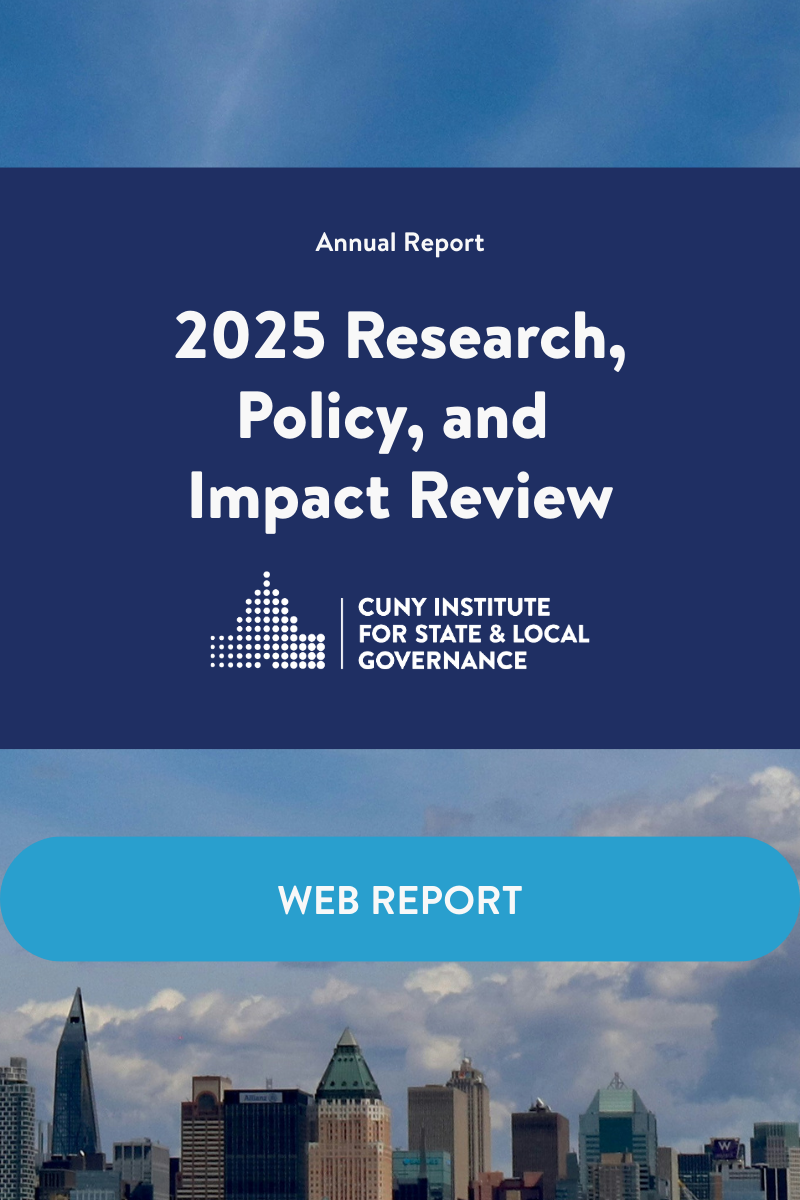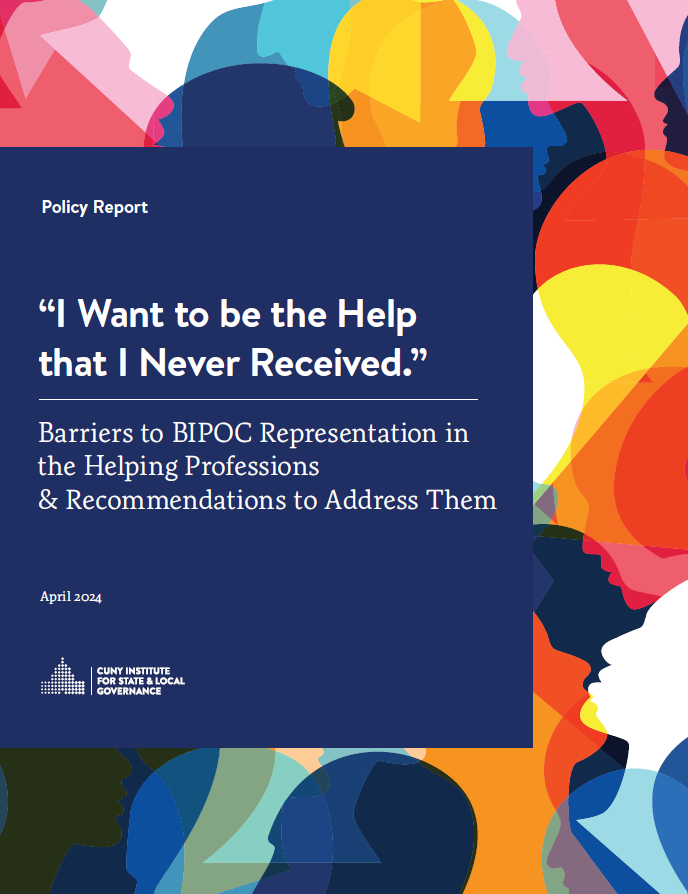RESOURCES
Knowledge Center
Outcomes, discoveries, and analysis from our breadth of good governance initiatives.

2025 Research, Policy, and Impact Review
This report captures not just some of what we produced in 2025, but how we worked—and why these approaches matter.

The Community-Based Restorative Justice Program: 2024-2025 Grantee Yearbook
This Yearbook was created to acknowledge a year’s worth of incredible work from the 16 Community-Based Restorative Justice program grantees during the End-of-Year Community Forum, a two-day gathering of grantees, philanthropy partners, and restorative justice practitioners on June 16th and June 17th, 2025.

A Blueprint for Social Service Navigation in NYC and Beyond
Drawing from a wealth of experience developing service navigation programs as well as research on data-informed, community-responsive approaches, this brief provides a guide to developing navigation programs that can help government and public institutions connect communities with care, creating safety and opportunity for all.

Building Better Public Sector Data
This brief details how CUNY ISLG staff work with governmental agencies, nonprofit organizations, and other partners to effectively collect, maintain, and use data, especially in the face of time and resource constraints.

Building Strong Communities through Strategic Investments
Reflecting on the past decade of work, this model brief takes stock of these four CJII goals; discusses how DANY, CUNY ISLG, and other partners achieved them; and provides a blueprint for practitioners, researchers, policymakers, and funders.

“I Want To Be The Help That I Never Received”: Barriers to BIPOC Representation in the Helping Professions & Recommendations to Address Them
CUNY ISLG embarked on a process to understand the barriers to becoming a helping professional generally and in particular for Black, Indigenous, and People of Color (BIPOC) persons, as well as challenges faced while working and advancing as one.
![[From Our Partners] An Evaluation of the Osborne Association’s Harlem FamilyWorks Program: Services Supporting Families Impacted by Incarceration](https://images.squarespace-cdn.com/content/v1/5fcea962a1b4d771ad256fcc/1649775931330-BEZR74Q0W12Y0Z19NOOC/Screenshot+%2863%29.png)
[From Our Partners] An Evaluation of the Osborne Association’s Harlem FamilyWorks Program: Services Supporting Families Impacted by Incarceration
Broadly, the evaluation aimed to document HFW’s implementation and identify its strengths, barriers to success, and best practices. The objectives for the evaluation were to document program operations, describe stakeholders’ and participants’ perspectives of the program, understand the characteristics of participants the program served, and develop recommendations for strengthening the program.
![[From Our Partners] An Evaluation of the Implementation of Project Reset: Interim Findings](https://images.squarespace-cdn.com/content/v1/5fcea962a1b4d771ad256fcc/1646674874593-759ZOBJPFNY0LLFIO6VO/Screenshot+%28104%29.png)
[From Our Partners] An Evaluation of the Implementation of Project Reset: Interim Findings
As of September 2020, the program has diverted and provided services to almost 2,000 individuals. In this report, information collected from program staff and participant interviews and surveys, programmatic data, and observations of programs describe how the program is implemented, identify key program facilitators and barriers, and illustrate participant experiences.
![[From Our Partners] Youth Opportunity Hubs: Mid-Evaluation Report](https://images.squarespace-cdn.com/content/v1/5fcea962a1b4d771ad256fcc/1642504172502-WU3303D0ZN0A6O45O0AZ/YOH_Mid-Evaluation_Report-2+cover.jpg)
[From Our Partners] Youth Opportunity Hubs: Mid-Evaluation Report
Youth Opportunity Hubs use a trauma-informed, positive youth development framework to provide comprehensive services to young people ages 13-24. By offering opportunities and emphasizing young people’s strengths, the Hubs aim to address both risk and protective factors—including in such areas as health, educational attainment, household income, and connections to school or work—and reduce the likelihood that youth will have interactions with the criminal legal system. This report highlights mid-evaluation findings related to the ongoing process evaluation conducted by Westat and Metis Associates of the Youth Opportunity Hubs initiative.

Reinvesting in Community: Criminal Justice Investment Initiative 2021 Annual Report
CJII’s comprehensive approach to public safety shows how investments in community-based initiatives increase opportunities, strengthen supports, heal prior trauma and injustice, and contribute to a stronger, safer city. The 2021 annual report shows that CJII-funded programs have directly supported more than 32,000 people in New York City. In addition, these programs have engaged at least 55,000 additional people in one-time workshops and trainings.

Equity Indicators Baseline Report: St. Louis Aligns Equity Indicators with Ferguson Commission's Calls to Action
In 2017 the City of St. Louis, in partnership with Forward Through Ferguson and United Way of Greater St. Louis, was chosen as one of five US cities to create an Equity Indicators tool through our initiative, funded by The Rockefeller Foundation. The tool is built around the three themes identified by the Ferguson Commission: Youth at the Center, Opportunity to Thrive, and Justice for All. Within each theme are three topics, and within each topic are eight indicators—for a total of 72 indicators that can be monitored each year to track St. Louis’ progress toward racial equity. This report provides a first year of baseline static scores; following years will produce change scores for each level of data based on the difference in scores from one year to the next.

Equity Indicators Baseline Report: Oakland's Equity Indicators Offer Foundation for New Department of Race and Equity
Oakland has a long history of activism around issues of inequity, and was chosen in 2017 among our first cohort of cities to develop local Equity Indicators through our initiative, funded by the Rockefeller Foundation. The purpose of this report is to develop a baseline quantitative framework that can be used by City staff and community members alike to better understand the impacts of race, measure inequities, and track changes in the disparities for different groups over time. This framework can then be used to guide and inform policies that address disparities.

Who Runs Our Cities? The Political Gender Gap in the Top 100 U.S. Cities
Women comprise half of the population, but are highly under-represented at all levels of government. While other studies look at women’s representation at the federal and state level, a new report from our Equity Indicators initiative examines their representation at the local level.
